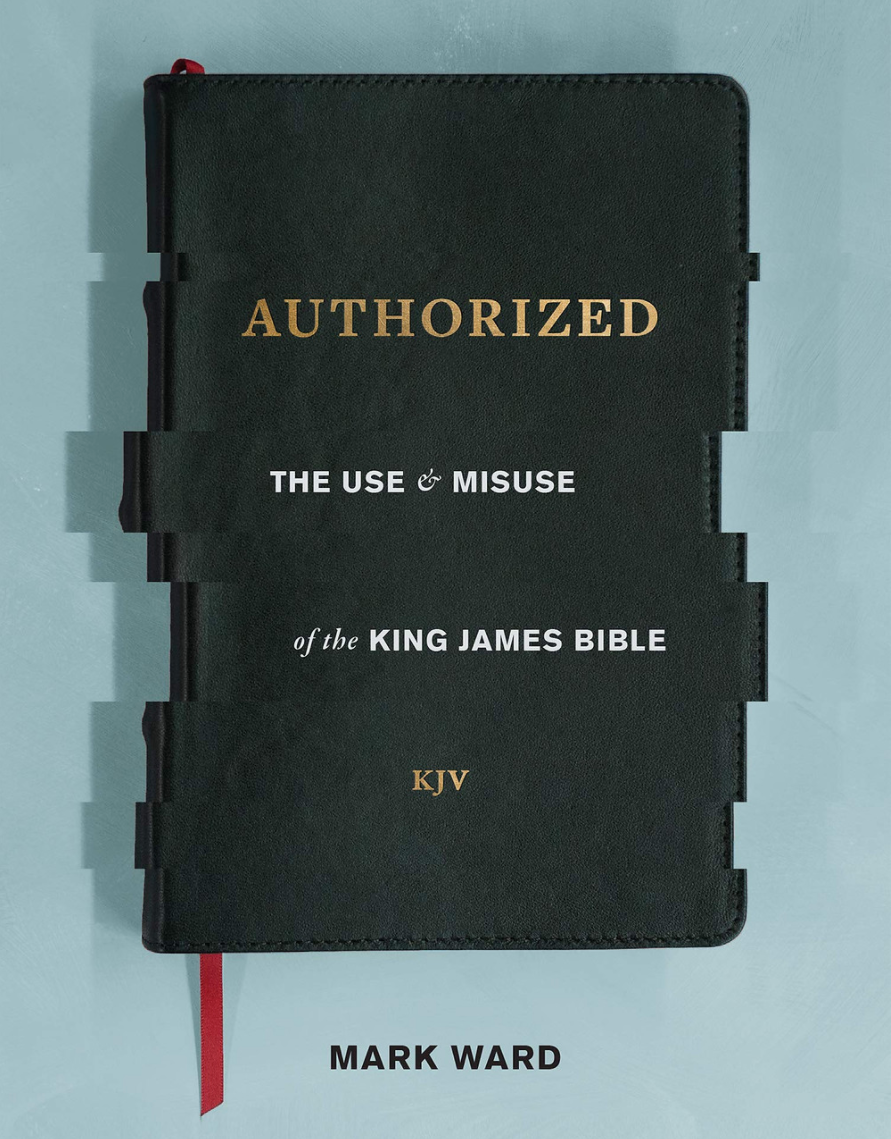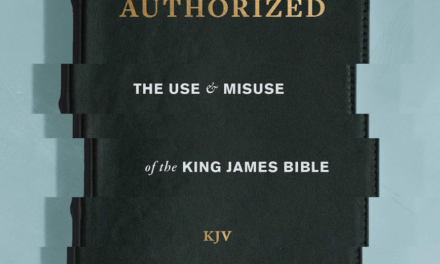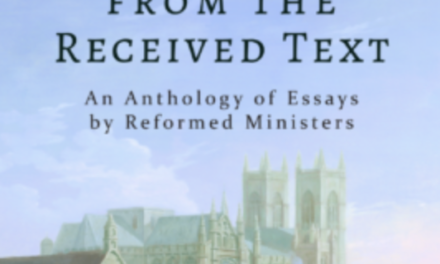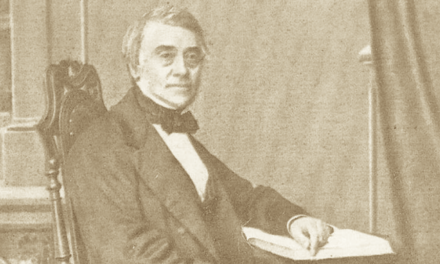Mark Ward
“Authorized: The Use & Misuse of the KJV"
Reviewed by Taylor DeSoto
Chapter One:
A Strange Start

Introduction
In the first article of this series, I highlighted several key observations from the introduction of Mark Ward’s book, Authorized: The Use & Misuse of the King James Bible. Notably that most people who read a Bible read the KJV (55%), that Mark Ward can read the KJV, and that the audience for this work seems to be those who do not read the KJV. The goal of this work seems to be to bolster the narrative that the KJV should be retired due to its lack of readability. In chapter 1 of the work, Ward gives the reader five things we lose as “the church stops using the KJV.”
He opens the chapter by listing some of the English Bibles leading up to the KJV to demonstrate that retiring Bible translations is a normal part of the Bible translation lifecycle. What he does not tell his reader is that these Bibles which were retired leading up to the KJV were extremely similar to the KJV, and presented to the reader the same text form as the KJV. The largest shift from these Bibles to the KJV was spelling and typesetting. In other words, these Bibles really weren’t all that different from each other. What is described as a normal process doesn’t offer the kind of analysis I would have hoped for. The KJV was produced at the end of a technological advancement – the printing press. It would have been nice to see more thoughtful analysis on what technological or scholarly change resulted in the “translation lifecycle” being kicked off the second time. Considering how long the KJV ruled supreme, the sudden advocation for it’s retirement is not what I would consider a normal process.
The shift from the KJV to modern translations isn’t as simple as updated spelling and syntax. It involves changing and removing verses from the underlying text and applying different translation methodologies. This is a huge gap that is completely ignored in Ward’s analysis. Ward says, “I don’t think many people have carefully considered what will happen if we all decide to let the KJV die and another take its office” (Ibid., 5). This signals that Ward believes he is writing to an audience who has not considered these issues, which points again to the reality that his audience are those who are not familiar with the KJV and its history and impact. Those that have not made such considerations are likely in the camp of people who have already adopted a modern translation. In this article, I will review Ward’s take on the “what we lose” discussion by evaluating his commentary on each of the five things.
We Lose Intergenerational Ties in the Body of Christ
Ward begins this section by appealing to an anecdote where his Grandma gifts his children their first Bibles due to, by his own admission, indecisiveness.
“I spent an inordinate amount of time before marriage considering which Bible translations I would hand to my children (inordinate because I didn’t even have a girlfriend at the time). I dithered so long in this decision, even after marriage and the birth of my three children, that Grandma ended up deciding for me by buying the kids Bibles. And one of the reasons I struggled so hard was that I knew that if I didn’t hand my kids KJVs I would be severing some rich connections between them and their heritage.”
Ibid., 6
Ward rightly notes that if he rejected this gift, he would be “severing some rich connections between them and their heritage.” Ward makes many powerful points here. The KJV connects Protestant Christians to their heritage, helps them become “skilled readers”, gives them easy access to the theological works of the Puritans and other post-Reformation divines, helps them understand the theological lexicon of English Christianity, helps them understand the hymns and psalms sung in churches today, and even provides a connection to the older generation who grew up on the KJV.
Despite this powerful argument for retaining the KJV, Ward ends this section by stating that while the strings that connect Protestants to the past are important, “we can’t keep all the strings. Some of them must or even should be cut. But let’s at least be aware of what we’re doing” (Ibid., 8). This section exemplifies the paradoxical nature of Ward’s thesis. In one breath, he gives great reasons for retaining the KJV, and at the same time argues that modern Christians should cut ties with it. This is, as I’ve come to recognize it, is a trademark of Ward’s rhetorical strategy. What the careful reader will notice is that Authorized offers many strong arguments to actually retain the KJV while simultaneously dismissing these reasons as unimportant.
We Lose Scripture Memory By Osmosis
This section does a great job demonstrating the the damage that has been caused by the inundation of Bible translations into the Christian church.
“When an entire church, or group of churches, or even an entire nation of Christians, uses basically one Bible translation, genuinely wonderful things happen.”
Ibid., 8
If it is wonderful for the church to share a translation, what word should we use to describe a Christian church that does not have a unified text? Awful? Dreadful? There is tremendous value in a church sharing the same translation, which Ward highlights in this section. In addition to Ward’s point, which is that much of Scripture is memorized in community, I will add that theology can be done more effectively in a community with one Bible. Unlike the Bibles leading up to the KJV, modern Bibles take different textual and translational choices which change the meaning of passages. In the best case scenario, competing translational choices add an additional step of exegesis into the church by forcing members to decide which translation is better, rather than simply being taught by the same text. I cannot tell you how many times I’ve sat in a Bible study that devolved into debates over which translational choice is the “best.” Here is yet another example of where Ward provides a powerful argument against his own thesis, which we will see later is to read a plethora of translations.
Ward then makes one of the most compelling arguments from God’s providence in favor of the KJV.
“But no other translation seems likely to serve in the role [of a unified translation]. If indeed the King is dying, it is just as sure that none of his sons or cousins have managed to become the heir apparent.”
Ibid., 9, brackets added
In other words, the Christian church had unity under one translation for centuries, now they do not, and it does not appear that this will happen in the age of modern translations. This is a point often presented by KJV advocates – that it will not change, and the church can rally around it. If there is no hope for unification around a single modern translation on the horizon, it seems to make more sense to rally around a translation that most of the church already reads.
We Lose a Cultural Touchstone
Ward opens this section by again comparing the shift from the KJV to modern versions to the shift from the KJV predecessors by using the Coverdale Bible as an example. The KJV is a polished and refined pinnacle of the translations produced during this time in history, which explains the dominance of the KJV during that time and beyond. The largest difference between the Coverdale and KJV is updated spelling and typesetting, and the modern reader would have a much harder time with the Coverdale for this reason. See John 1:1-2 as an example.
“In the beginning was the worde, and the worde was with God, and God was ye worde. The same was in the beginning wt God.”
The Coverdale is actually a great example of a Bible that needed an update for standardized spelling, and the KJV was a perfect successor. It was also based in Tyndale’s New Testament, which the KJV retains up to 95%. Comparing the Coverdale to the KJV is like comparing a red delicious apple to a honeycrisp apple, whereas comparing the KJV to the NIV is like comparing an apple to a grapefruit. It is important that the reader understands the rhetorical tool Ward is employing here.
It is interesting that Ward then employs Dawkins and Hitchins, infamous critics of Christianity, to rebuke himself and the modern Christian church. Here is Hitchins on the importance of the KJV:
“A culture that does not possess [the KJV’s] common store of image and allegory will be a perilously thin one. To seek restlessly to update [the Bible] or make it “relevant” is to miss the point, like yearning for a hip-hop Shakespeare.”
Ibid., 11
Even the heathen can recognize the importance of the KJV. Ward finishes the section by making a theological blunder. He states that Hitchens is “confusing ‘the Bible’ and translations of the Bible.” Here is a reminder to the reader that an accurate translation of the original languages is the Bible. The Scriptures were immediately inspired in the original languages, and accurate translations of these texts are mediately inspired and are equally the Bible (WCF 1.8, LBCF 1.8). This theological mistake is often used against people who advocate for the use of a single translation. What most people who make this argument don’t realize is that it sets a precedent for an undefined Bible.
We Lose Some of the Implicit Trust Christians Have in the Bibles in Their Laps
It is difficult to understand at this point why Ward has argued to sever ties with the KJV. Not only has he made several compelling arguments for it’s retention, he has eviscerated any case that can be made for adopting a modern translation.
“It follows on from the second point: as the KJV fades, so does at least some of the trust Christians have in their Bible translations.”
Ibid., 11
“Bible translations succeed or fail based on Christian trust, because only a vanishingly small percentage of Bible readers can, and even fewer do, go through the laborious process of checking their English translations against the Greek and Hebrew. The vast majority of Bible readers simply take—they have to take—the word of others that the translations in their laps are faithful. When scholarly Christians and ministry-leading Christians go to battle over Bible translations, in dog fights far above the it’s-all-Greek-to-me heads of people in the pew, some of the flak falls on the flock.”
Ibid., 12-13
Not only does Ward point out that ever-evolving translations diminish trust that Christians have in their Bible, but also that the modern method of Bible reading imposes a gate keeping process that pressures Christians to be bound to a lexicon while reading so that they can understand what “it really says in the original.” The layman is encouraged to learn Greek and Hebrew to understand the “true” meaning of their English Bible, rather than simply reading what’s on their lap. I have argued before that this establishes a neo-papacy with the academics as pope. You can’t read your Bible for yourself, the scholars must tell you how to read it, what verses to read, and how those verses ought to be translated.
We Lose Some of the Implicit Trust Non-Christians Have in Scripture
The title of this section speaks volumes to the damage that has been done in the last 100 years. I recall a recent debate where a belligerent atheist held up a KJV, tried to throw it in the trash, and then held up a blue Nestle-Aland text to his Christian opponents and mocked them for not having a Bible. While I do not think the critiques that Atheists have of Holy Scripture are particularly important, it demonstrates how devastating the current state of the English Bible is to Christian apologetics. Ward takes notice of this as well.
“The more Bible translations we have, and particularly the more Christian fur they see flying over them on the Internet, the less reason non-Christians will have for believing that the Bible speaks with one voice. A rising tide can sink all boats, at least a little.”
Ibid., 13-14
He again quotes Hitchens:
“Not to over-prize consensus, it does possess certain advantages over randomness and chaos. Since the appearance of the so-called “Good News Bible,” there have been no fewer than 48 English translations published in the United States. And the rate shows no sign of slackening. Indeed, the trend today is toward what the trade calls “niche Bibles.” These include the “Couples’ Bible,” “One Year New Testament for Busy Moms,” “Extreme Teen Study Bible,” “Policeman’s Bible,” and—somehow unavoidably—the “Celebrate Recovery Bible.” (Give them credit for one thing: the biblical sales force knows how to “be fruitful and multiply.”) In this cut-price spiritual cafeteria, interest groups and even individuals can have their own customized version of God’s word.”
Ibid., 14-15
Ward ends this section with a powerful retort to the atheist’s critique when he says,
“As it is written in the prophets: ‘Ouch.’”
Ibid., 15
We often hear that the Modern Critical Text is necessary for apologetics, yet in Ward’s own words we see that this is not the case.
Conclusion
In the first chapter of his book, Ward makes a compelling argument for the benefit of retaining the KJV, and highlights the damage that modern versions have had on unity in the church and Christian apologetics. Ward lightens the mood by presenting his reader with what seems to be a poorly placed joke.
“Should we permit the KJV to slide into disuse, when we lose so many things of value along with it? Okay, maybe the bath water is getting a bit tepid, but the babies—think of the babies!”
Ibid., 16
Yes, after demonstrating the serious problems modern versions have caused and the opinions of prominent atheists on the matter, Ward feels it is appropriate to offer his reader some light-hearted humor. He ends the chapter by asking, “What do we do with the KJV?” I think a more appropriate question is, “What do we do with Mark Ward?” How is the reader of Authorized supposed to reconcile his paradoxical thesis?
Thus far in Authorized: The Use & Misuse of the King James Bible, Ward has shown his reader several important realities: The first is that of the people who read their Bible, most read the King James Version. The second is that there is a tremendous benefit to the unity of the church and to Christian apologetics in retaining a unified translation. The third is that there is no other translation that has taken the spot of the KJV or can take the spot of the KJV. Despite this, it seems that Ward is working towards telling us why we should cut ties with the KJV. As a KJV reader, Ward has done a great job in reassuring me that my decision to put down my ESV was the right call.



